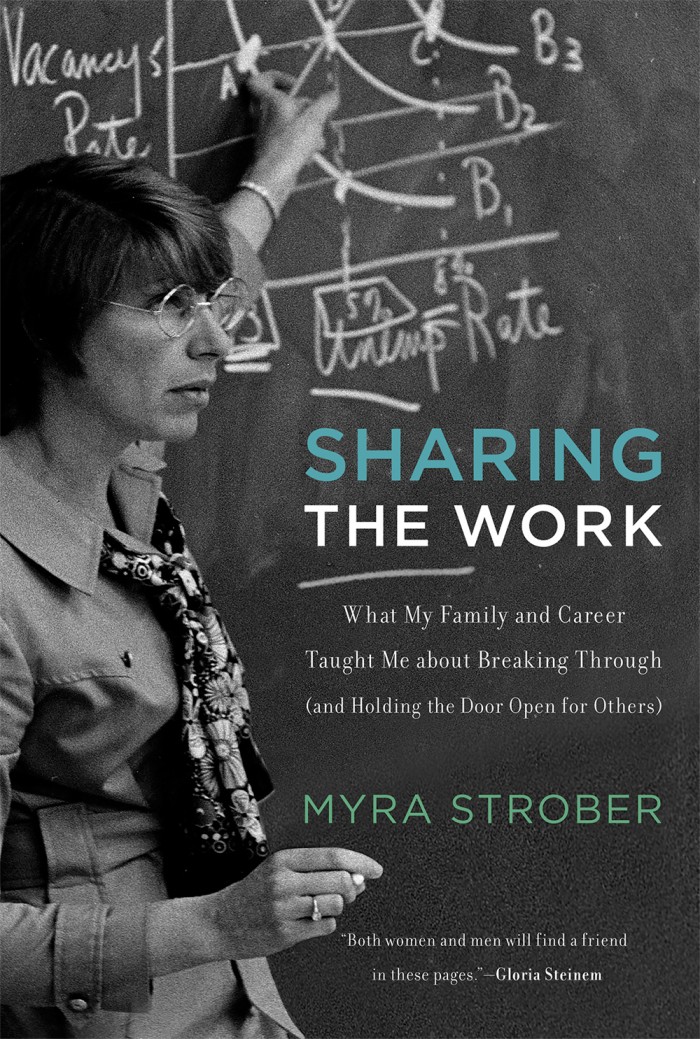As a young, married mother of two in 1970, labor economist Myra Strober, PhD ’69, was struggling to stay on a career path in
academia while keeping up with the demands of her home life. When she learned from the head of the economics department at Berkeley, where she was teaching, that she would never be considered for tenure, she understood that it was because she was a mother. Her anger at that injustice inspired a lifetime of pioneering teaching and research on women in the workplace. In her new memoir published by the MIT Press, Sharing the Work: What My Family and Career Taught Me about Breaking Through (and Holding the Door Open for Others), Strober blends findings from her academic work with the details of her personal journey as a woman in a field dominated by men.

By Myra Strober, PhD ’69
MIT Press, 2016, $29.95
Strober, a professor emerita at Stanford who was the founding director of the university’s groundbreaking Center for Research on Women (now the Clayman Institute for Gender Research), had often told her classes stories about her own experiences, but she only recently realized they might be good fodder for a book. “I began noticing that as the years passed, students were more and more surprised by these stories,” she says. “They hadn’t faced the kind of discrimination I’d faced, and they hadn’t been in situations where they were the lone woman in a classroom or in a faculty meeting, and so I thought, Well, it’s wonderful the way things have changed, but I hope these students understand that there’s a history behind the victories.”
She’s been intrigued by the responses to her memoir thus far. “The book is like a Rorschach test,” she says. “Many of the women from my generation are interested because my experiences remind them of their own experiences. Younger people have no idea what it was like to grow up in the kind of family I grew up in ... People have different reactions depending on their own lives.”
A significant part of Strober’s life story involves her Jewish faith, and she has found that resonates with readers as well. “They like the fact that I am a feminist but I am also interested in my spiritual life,” she says. Many of her childhood memories revolve around her grandfather, a religious man, and her desire to learn from him. In fact, one of her earliest inklings that she had what she calls a “feminist inclination” came at shul at age 12, when her grandfather for the first time sent her to the balcony to sit with the women in his Orthodox congregation instead of with him. But over the decades, Strober has seen women make progress in her own religion as well as in the workplace: in 2006 she became a bat mitzvah, more than 50 years after her Hebrew teacher told her, “Bar mitzvahs are for boys.”
Recent Books
From the MIT Community
Groovy Science: Knowledge, Innovation, and American Counterculture
Edited by David Kaiser, professor of physics and the history of science, and W. Patrick McCray
University of Chicago Press, 2016, $25
Knowledge Games: How Playing Games Can Solve Problems, Create Insight, and Make Change
By Karen Schrier, SM ’05
Johns Hopkins University Press,
2016, $34.95
Ebola’s Message: Public Health and Medicine in the Twenty-First Century
Edited by Nicholas G. Evans, Tara C. Smith, and Maimuna S. Majumder, SM ’15
MIT Press, 2016, $45
Matchmakers: The New Economics of Multisided Platforms
By David S. Evans and Richard Schmalensee ’65, PhD ’70, professor at the Sloan School of Management Harvard Business Review Press,
2016, $35
The City of Tomorrow: Sensors, Networks, Hackers, and the Future of Urban Life
By Carlo Ratti, professor of the practice, Department of Urban Studies and Planning, and Matthew Claudel, SM ’16
Yale University Press, 2016, $20
Exploratory Programming for the Arts and Humanities
By Nick Montfort, SM ’98, professor of digital media
MIT Press, 2016, $40
Led from a Distance
By Harry Newman ’83
Louisiana Literature Press, 2016, $8.95
Please submit titles of books and papers published in 2016 and 2017 to be considered for this column.
Contact MIT News
E-mail mitnews@technologyreview.com
Write MIT News, One Main Street, 13th Floor, Cambridge, MA 02142
Keep Reading
Most Popular
Large language models can do jaw-dropping things. But nobody knows exactly why.
And that's a problem. Figuring it out is one of the biggest scientific puzzles of our time and a crucial step towards controlling more powerful future models.
The problem with plug-in hybrids? Their drivers.
Plug-in hybrids are often sold as a transition to EVs, but new data from Europe shows we’re still underestimating the emissions they produce.
Google DeepMind’s new generative model makes Super Mario–like games from scratch
Genie learns how to control games by watching hours and hours of video. It could help train next-gen robots too.
How scientists traced a mysterious covid case back to six toilets
When wastewater surveillance turns into a hunt for a single infected individual, the ethics get tricky.
Stay connected
Get the latest updates from
MIT Technology Review
Discover special offers, top stories, upcoming events, and more.